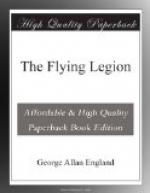Plainly, about three feet below the bottom of the silken veil and four feet above the pavement, there indeed they saw the inestimably sacred stone, which every Moslem believes once formed a part of Paradise and was given by Allah to the first man. To the Legionaries’ excited eyes it seemed to be an irregular oval, perhaps seven inches in diameter, with an undulating surface composed of about a dozen smaller stones joined by cement and worn blackly smooth by millions of touches and kisses.
It was surrounded by a border of cement that looked like pitch and gravel; and the major noted, even as he drove his pick into this cement, that both the stone and the border were enclosed by a massive circle of gold with the lower part studded full of silver nails.
Only these hasty observations, and no more, the Legionaries made as they fell with furious energy to the task of dislodging the venerable relic. To all but this labor they were oblivious—to the heat and stifle of that sun-baked square, the mute staring of the paralyzed Hujjaj, the wafting languor of incenses from the colonnades, the quiet murmur of waters from the holy well, Zem Zem.
The scene, which ordinarily would have entranced them and filled them with awe, now had become as nothing. Every energy, every sense had centered itself only on this one vital work of extracting the Black Stone from the Ka’aba wall and of making a swift getaway with it before the rising murmur of rage, from without the area of paralysis, should sweep in on them with annihilating passion.
“Here, Emilio—drive your pick here!” commanded the major, his red face now dark crimson with heat and excitement as well as with the intense force wherewith he was wielding his implement. Cement flew in showers at every stroke, out over the sweating Legionaries and the prostrate Moslems near the stone. The white men slid and stumbled on limp bodies, trampled them unheedingly, and of the outstretched pilgrims made as it were a kind of vantage-post for the attack on the inmost citadel of Islam.
“Work quick, Major!” came the Master’s voice, seemingly at Bohannan’s elbow. “There’s a fearful drove of the rascals coming. You’d better get that stone out and away in double-quick time!”
The major replied nothing, but his pick-axe flailed into the cement with desperate energy. Emilio and others seconded him, while Rennes and Wallace dug, kneeling, with their crowbars. The blows echoed with staccato rapidity through the sacred Haram, which now had begun to fill with the confused roar of the on-coming mobs from the Ma’abidah suburb and the Plain of Mina, from Jebel Hindi and the Sulaymainyah quarter.
“You have about five minutes more,” the Master spoke again. “If necessary, we will open on them with machine-guns, from the ship, but I’d like to avoid bloodshed if possible. Do the best you can!”
Bohannan had no breath for answering. Every ounce of energy of all seven men was being flung into that mad labor. Sweat streamed into their eyes, half blinding them; they dashed it off, and struck again and again. The cement crumbled and gave; the heavy gold band commenced to bend; Rennes got his crowbar into an advantageous leverage and gave a mighty heave.




